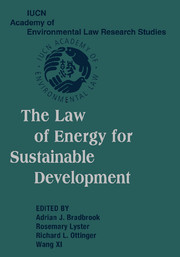Book contents
- Frontmatter
- Contents
- Acknowledgments
- Message from Kofi A. Annan, Secretary-General, United Nations
- Introduction – A Global Learned Society to Address Earth's Evolution: The IUCN Academy of Environmental Law
- Public Lectures on International Environmental Law
- PART ONE SUSTAINABLE DEVELOPMENT AND THE ROLE OF ENERGY LAW
- 1 Development and Energy
- 2 The Imperatives of Energy for Sustainable Development
- 3 2020 Energy Demand of China and Energy Conservation
- 4 Sustainable Development and the Marrakech Accords
- 5 Ethical Implications
- 6 Technological Implications
- PART TWO LEGAL ISSUES IN CONTEMPORARY ENERGY LAW
- PART THREE INTERNATIONAL ENERGY LAW
- PART FOUR COMPARATIVE ENERGY LAW
- PART FIVE ELECTRICITY RESTRUCTURING
- PART SIX FINANCING FOR SUSTAINABLE ENERGY
- PART SEVEN CIVIL SOCIETY AND THE PROCEDURAL REQUIREMENTS OF ENERGY LAW FOR SUSTAINABLE DEVELOPMENT
- Index
5 - Ethical Implications
Published online by Cambridge University Press: 10 August 2009
- Frontmatter
- Contents
- Acknowledgments
- Message from Kofi A. Annan, Secretary-General, United Nations
- Introduction – A Global Learned Society to Address Earth's Evolution: The IUCN Academy of Environmental Law
- Public Lectures on International Environmental Law
- PART ONE SUSTAINABLE DEVELOPMENT AND THE ROLE OF ENERGY LAW
- 1 Development and Energy
- 2 The Imperatives of Energy for Sustainable Development
- 3 2020 Energy Demand of China and Energy Conservation
- 4 Sustainable Development and the Marrakech Accords
- 5 Ethical Implications
- 6 Technological Implications
- PART TWO LEGAL ISSUES IN CONTEMPORARY ENERGY LAW
- PART THREE INTERNATIONAL ENERGY LAW
- PART FOUR COMPARATIVE ENERGY LAW
- PART FIVE ELECTRICITY RESTRUCTURING
- PART SIX FINANCING FOR SUSTAINABLE ENERGY
- PART SEVEN CIVIL SOCIETY AND THE PROCEDURAL REQUIREMENTS OF ENERGY LAW FOR SUSTAINABLE DEVELOPMENT
- Index
Summary
INTRODUCTION
In 1999, the UNESCO World Commission on the Ethics of Scientific Knowledge and Technology (COMEST) set up a Subcommission on the Ethics of Energy. One year later, the Subcommission presented its first report. The report begins with the following sentence:
Sustainable development, meaning the use of our planetary resources for the well-being of all its present and future inhabitants, has become the concept which must guide both individual and collective action at every level and national and international policies.
This is a remarkable statement as it contains the three key ethical challenges of energy for sustainable development:
The concept of sustainable development is to guide energy decision making at all levels, personal and collective, national and international. This calls for a broadening of our ethical concerns for energy. Energy is no longer a matter of maximizing supplies for more and more people, it is also a matter of social, environmental, and future equity.
Sustainable development is concerned with the well-being of all, not just human inhabitants of the planet. The inclusion of nonhuman beings poses important ethical challenges to the concept of sustainable development.
The guidance of sustainable development is seen as a must, not a mere consideration for our actions. This raises the question of ethical guidance for energy policy and law.
This chapter will focus on the second and third of these challenges.
- Type
- Chapter
- Information
- The Law of Energy for Sustainable Development , pp. 74 - 92Publisher: Cambridge University PressPrint publication year: 2005
- 1
- Cited by

